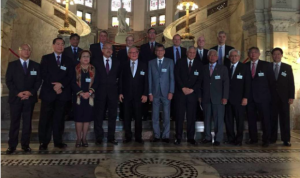Why did the international court hearing the arbitration case of the Philippines against China’s claims in the South China Sea choose not to allow the United States to send observers to the second round of oral arguments in The Hague?
“A request by the United States of America to send an observer was declined as the United States of America is not a party to the Convention,” the United Nations arbitral tribunal said in its statement issued on Tuesday morning.
While the week-long hearing which began on November 25 was not open to the public, the tribunal allowed seven countries to send small delegations to serve as observers.
READ: 7 countries send observers to monitor PH case vs China
These are Australia, the Republic of Indonesia, Japan, Malaysia, Singapore, the Kingdom of Thailand, and the Socialist Republic of Viet Nam.
Malaysia and Vietnam are fellow claimants in the South China Sea, while Indonesia which is not officially a claimant, had recently asked China to clarify its claims to nearly all of the strategic waterway.
According to Supreme Court Senior Associate Justice Antonio Carpio, the Philippines will lose 80 percent of its exclusive economic zone (EEZ) to China’s nine dash line claim, including the entire Reed Bank and part of the Malampaya gas field.
READ: UN tribunal to issue ruling on PH vs China case by 2016
Malaysia, on the other hand, would be deprived about 80 percent of its EEZ in Sabah and Sarawak facing the South China Sea, as well as most of its active oil fields in the same area.
Vietnam, meanwhile, would lose about 50 percent of its total EEZ and Brunei loses about 90 percent of its total EEZ.
Indonesia stands to lose about 30 percent of its EEZ facing the South China Sea in Natuna Islands, whose surrounding waters comprise the largest gas field in Southeast Asia, Carpio said.
The tribunal said the United Kingdom was granted permission to observe the proceedings, but it ultimately chose not to do so.
The United States, while it has participated in the negotiations that led to the adoption and the subsequent modifications of the international treaty known as the United Nation Convention on the Law of the Sea (Unclos) has not ratified it.
As of January this year, the European Union and 166 countries, including China and the Philippines are parties to the Unclos.


